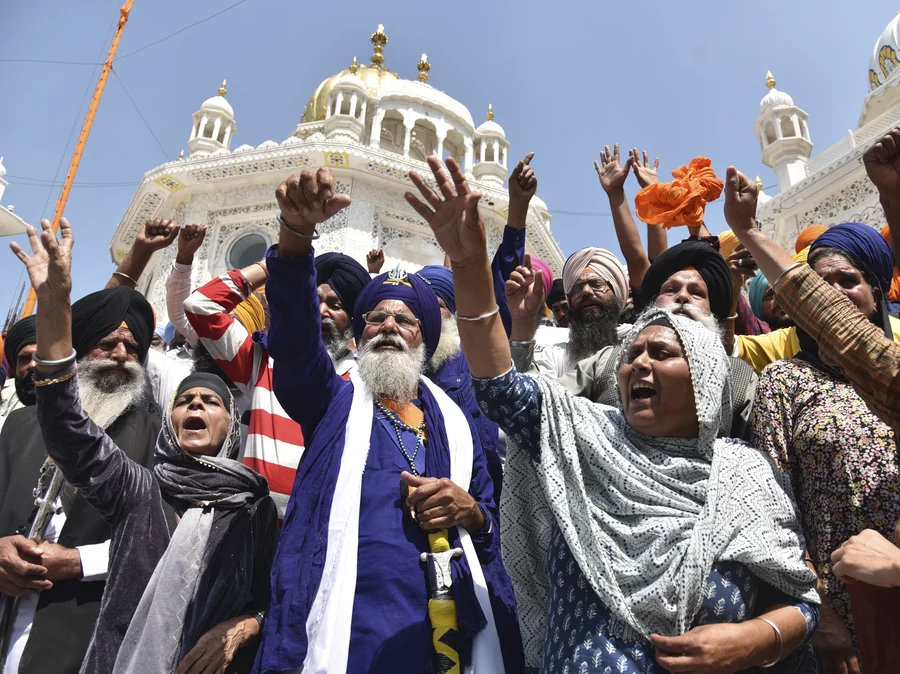Despite being the world’s largest democracy, India has repeatedly faced criticism for violating the human rights and liberties of those under its jurisdiction. As the administration of Prime Minister Modi launched a crackdown against Waris Punjab De (WPD), the wounds left by “Operation Blue Star,” a military operation that resulted in the deaths of thousands of Sikhs in 1984, remained fresh. Along with Muslims and Christians, the Rashtriya Swayamsevak Sangh (RSS)-affiliated Bharatiya Janata Party (BJP) is now targeting Sikhs in India. In stark contrast to Gandhi and Nehru’s vision of a secular India, the Modi government’s treatment of minorities is indicative of its desire to transform India into a Hindu state.
Waris Punjab De: The Crackdown
Sikh minorities concentrated in Punjab are more vulnerable to state violence, particularly WPD followers and other Sikhs who have faced harsh persecution. This action has sparked outrage in the Sikh community, both in India and abroad.
Furthermore, there are grave concerns that Amritpal will be eliminated in staged police encounters in order to quell the Sikh rights movement.
Amritpal is a prominent leader of the Khalistan Movement, which was established in the 1940s after decades of Sikhs asserting their separate identity. In Amritsar, authorities conducted raids at a gurdwara and a drug rehabilitation center run by the WPD. There are fears that the police will file fictitious criminal charges against many of the Sikhs detained during the current searches. In addition, a substantial number of Sikhs who have already served their court-imposed sentences remain illegally incarcerated in Indian prisons.
Deep Sidhu, WPD’s founder and first leader, passed away, and Amritpal Singh Sandhu ascended to the helm. Almost immediately thereafter, the state apparatus began to harass him by revoking the weapon permits of his guards and imprisoning his allies. Before the start of the crackdown, mobile phone service was blocked in Sri Muktsar Sahib and Fazilka districts on March 18, 2023, when Section 144 was implemented. Amritpal Singh and his other associates were among the many Sikhs detained by the police.
India: The Diaspora of Sikhs
The perceived persecution of the Sikh minority in Indian Punjab, in particular, and India, in general, has infuriated the Sikh diaspora.
International mayhem has been unleashed. Members of the Sikh diaspora in London walked the streets and gathered in front of the Indian High Commission to deliver a letter of complaint to the Indian ambassador. During the protest, an enraged Sikh community member attempted to replace the Indian flag with the flag of Khalistan.
The World Sikh Organization of Canada (WSO) criticized the “security” measures taken in Punjab to apprehend Amritpal Singh. In a press release, WSO stated that state-wide cordon and search operations were now in effect throughout Punjab. It went on to express concern that the pandemonium surrounding “Brother” Amritpal Singh’s detention could be used to stage a fake encounter and rationalize his unlawful execution. Throughout the 1980s and 1990s, the Punjab police frequently employed a similar tactic to eliminate Sikh activists, the group emphasized. In addition to requesting the immediate restoration of civil rights and Internet access in Punjab, the letter implored the Canadian government to hold India accountable for its actions.
Jagmeet Singh, one of the leaders of the New Democratic Party in Canada, stated, “I am deeply concerned about reports that India has suspended civil liberties and imposed an internet blackout throughout the state of Punjab.” Moreover, he stated that such draconian measures unnerved several individuals owing to the way they were used in extrajudicial killings and enforced disappearances that occurred during the 1984 Sikh Genocide.
The Plight of Indian Minorities
The use of force by Indian authorities against unarmed people, especially members of minority groups, is not unprecedented.
In several instances throughout Indian history, the government has been complicit in attacks on civilians.
Indian policy toward the Sikh population is at present seemingly consistent with its treatment of the Muslim population in Indian-occupied Jammu and Kashmir (IOJK). The fate of Indian minorities is contingent upon the international community’s efforts to restrain the brutality of its extremist government. During the G20 Summit, which will be held in Kashmir under India’s presidency, major international stakeholders will have the opportunity to discuss human rights violations, the right to self-determination, and the mistreatment of Muslim and Sikh minorities.
The views expressed in this article are the author’s own. They do not necessarily reflect the editorial policy of the South Asia Times.







